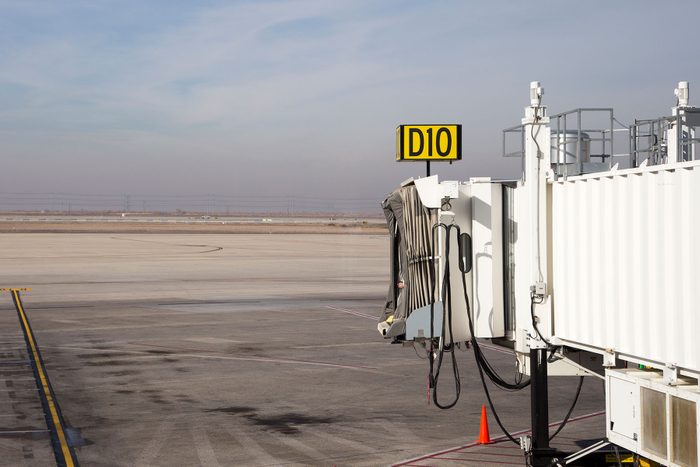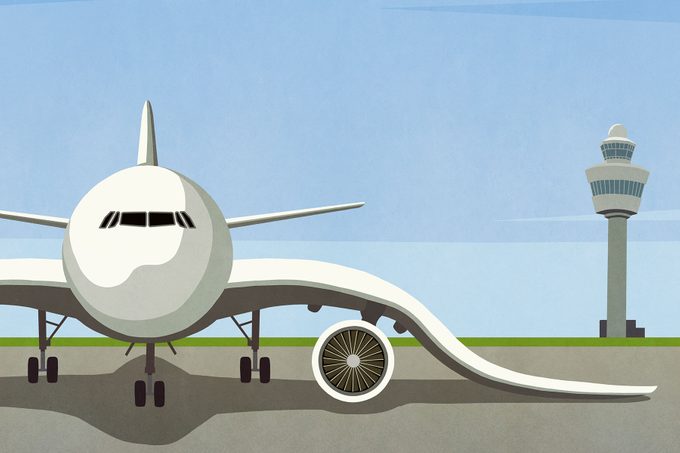What Is Skiplagging? Everything You Need to Know About This Travel Hack
Updated: Aug. 22, 2023

Travelers are avoiding shockingly high prices to smaller airports by booking cheaper flights with this ingenious trick
Need to book a flight to a smaller city and find the price to be astronomically high? This can be especially frustrating when you realize how cheap it is to fly from one big city to another, even if that means doing a layover in a smaller city to get there. So … what if you could take advantage of the system that seems to be working against you so you can get the best airfare possible?
Popularly known as “skiplagging,” this clever airline hack allows travelers to save big on their next flight to whatever destination they choose—even if that means not completing the journey that’s on their itinerary. Here’s how it works.
What is skiplagging?
Skiplagging is a process that allows travelers to find the best flight price to their final destination by avoiding “hidden city fees,” even if the final destination on their ticket isn’t technically where they intend to go.
Here’s how it works: Instead of booking a direct flight to a particular location, the skiplagger will book a cheaper flight to a larger city or airline hub, with a layover in the destination they actually want to travel to. So, for example, instead of flying directly from Denver to Nashville, the traveler could book a ticket from Denver to New York City with a layover in Nashville. And instead of finishing off the itinerary on the original ticket, the traveler will just stay in Nashville.
So how come these flights end up being cheaper? Given that larger airports tend to function as “hubs” for airlines—like JFK in New York, or O’Hare in Chicago—prices to these major destinations are likely to be cheaper. This is due to the competitive nature of the market; airlines want to offer the best prices to major destinations, so those flights are often less expensive.
However, in some cases, this could mean layovers in smaller cities to get to the bigger destinations, which is where skiplagging comes in. But the process doesn’t always work as smoothly as some travelers may think.
Why is skiplagging controversial?

While skiplagging can be useful for travelers looking to save a little cash, there are certain dilemmas that can occur for the traveler. For example, a skiplagger would not be able to check a bag because the bag would fly to the final destination, not the layover city. And while it’s easy to plan on not checking a bag, if you end up on a full flight that requires bags to be checked at the gate to your “final” destination, you’ll have a problem when you get to your layover city, where you plan to make your escape.
Second, if you don’t get on that flight to your final destination, this means the airline would end up with an empty seat that could have been filled. Airlines find this frustrating, especially if they have a large standby list of customers for that flight.
Last, skiplagging could create a rift in your relationship with an airline. If you’re the type of traveler who likes to rack up points, miles, member discounts and flight status for boarding, these types of benefits could be taken away—especially if an airline has a particular policy regarding skiplagging.
However, this does not mean the practice of skiplagging is illegal.
Is skiplagging illegal?
In short, no. Skiplagging is not illegal and can be a viable practice for people looking to save money on flights. While certain airlines may have policies regarding skiplagging (and could ban travelers from using their services in the future), it is not illegal by law.
Some apps have even been invented to provide this service, such as Skiplagged. Just like any other online booking service, Skiplagged shows the different deals available to your true final destination—even if you’re booking a flight to somewhere else so you can take advantage of a layover. And while United Airlines attempted to take down this company, alleging that the service is “strictly prohibited” and demanding a recoup in lost revenue, Skiplagged won the lawsuit, given that this particular booking strategy is not illegal. Skiplagged does not take a profit and is merely providing information regarding hidden city fees, helping travelers find the best bang for their buck.
Sources:
- Skiplagged
- CNN Money: “Why is United Airlines suing a 22-year-old?”
- CNN Money: “Judge throws out United Airlines lawsuit against 22-year-old”
- Simple Flying: “Skiplagging: What It Is, And Why It Is Controversial”
